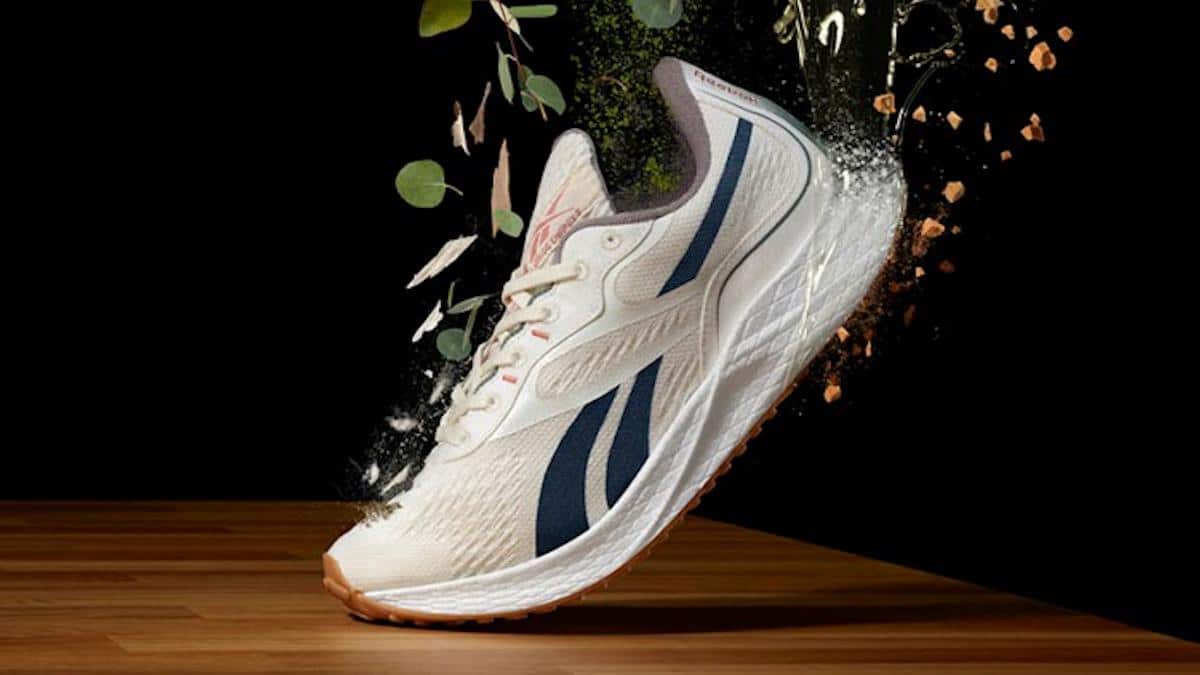
Are Biodegradable Shoes the Future of Footwear?
At Reebok's Innovation Lab in Boston, MA, engineers are working to create shoes made 100% from plants.

Reebok Floatride Energy GROW shoes are animal-free and made from at least 50% plant-based components. Reebok
At Reebok’s Innovation Lab in Boston, MA, engineers are working to create sustainable footwear. The shoes will be made 100% from plants with zero plastic, and, hopefully, be fully biodegradable so you can bury them in your backyard, Fast Company reported.
Currently, many shoes are made of leather and petroleum-based materials. These don’t degrade quickly or at all under natural conditions. As a change in stride, Reebok, as a company, has been experimenting to building a truly sustainable shoe for years.
Different products have featured different advances in materials. For example, Reebok’s [REE]GROW line shoes are animal-free and at least 50% plant-based with components like eucalyptus knit, natural rubber and bloom algae. Shoes and clothes in the REE[CYCLED] line are “amplified” with recycled materials like plastic bottles, PET plastic pellets and flakes and polyester thread. With each iteration and innovation, Reebok moves closer to their “Earthshot” commitment: to have 100% of their products be sustainable by 2030, the brand sustainability pledge notes.
“We’ve made some great strides in building more sustainable footwear over the past few years,” said Mike Andrews, Reebok’s director of advanced development and the project lead/R&D lead for several of the sustainable shoe lines. “We’re really proud of our progress, but we know there is still quite a ways to go. Right now, our development focus is on creating footwear that is 100% plant-based and contains no plastic.”
The biggest challenge in making sustainability strides is that the materials to do so literally don’t exist, Fast Company reported. Reebok has to invent these new, sustainable components as they go, testing them for durability and environmental prowess. Currently, they’re “working closely” with a U.S.-based supplier to develop materials that are 100% plant-based and which contain no petroleum-based plasticizers, additives or modifiers, Andrews told EcoWatch.
“Our goal is to build shoes that are comfortable, durable and certified by the USDA’s BioPreferred program as 100% bio-based,” he added. He did note that while compostability is an “active” and “long-term goal, the current iteration is still “a little ways away from that.”
As for how Reebok can assure their new sustainable shoes won’t degrade too early or sacrifice performance, Andrews said, “The secret sauce is in the proprietary curatives that help these materials stand up to the wear and tear of everyday use.”
All of this adds up to a different mindset towards designing and manufacturing. “We certainly understand the urgency and we recognize that we need to be part of the solution,” Andrews said.
He noted that while the Cotton & Corn and [REE]GROW lines of footwear focused primarily on the front end and using materials from plants instead of petroleum, Reebok’s longer-term goal is to create products that are sustainable at every step in their lifecycle in addition to being stylish and durable.
Reebok is not the only footwear company with the future in mind. Indeed, many are making material revolutions by using innovative components and recycled materials or going carbon neutral. These revolutions come at a time when consumer and brand consciousness about the damaging effects of “fast fashion” are driving efforts to create a more sustainable industry.
In line with these shifts, Reebok has been working for the last seven years in the sustainable shoe space. The brand has brought awareness to the viability of bio-plastics as a commercial alternative to petrochemicals, Andrews said, but there is still a lot of work to be done to realize the shoe giant’s visions for the future.
“But we’re 100% committed to this,” Andrews concluded. “It IS the future.”
Tiffany Duong is a writer, explorer and inspirational speaker. She holds degrees from UCLA and the University of Pennsylvania Carey Law School. As a contributing reporter at EcoWatch, she gives voice to what’s happening in the natural world. Her mission is to inspire meaningful action and lasting change. Follow her on Twitter/Instagram/TikTok @tiffmakeswaves.
- Three Major Companies Are Making Sustainable Products - EcoWatch
- 6 Best Eco-Friendly Shoes to Reduce Your Footprint
- Adidas Sold a Million Shoes Made of Ocean Plastic - EcoWatch
- Eco-Friendly Sneaker Startup Fights Fast Fashion With 85 Percent ...

 233k
233k  41k
41k  Subscribe
Subscribe 